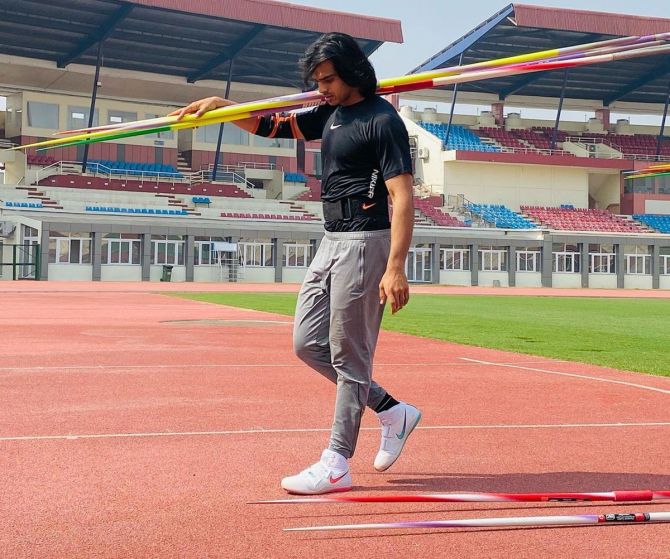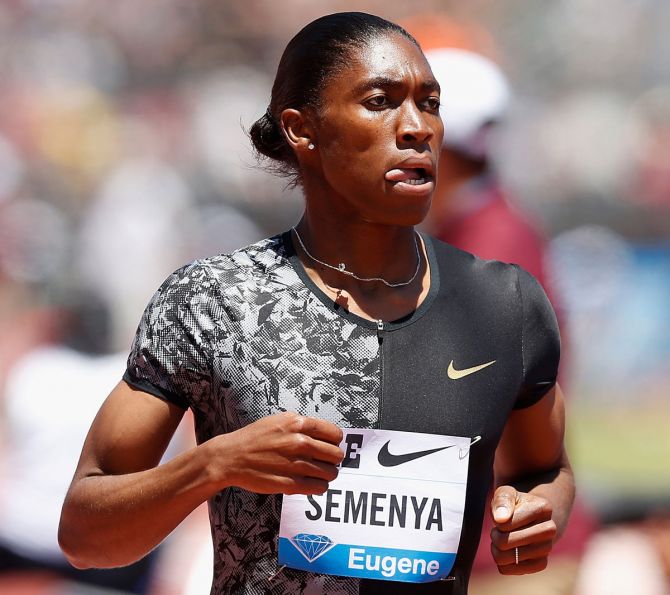 | « Back to article | Print this article |

Athletics Federation of India (AFI) has installed a special strength-building German machine for the use of the country's elite javelin throwers like Olympic-bound Neeraj Chopra and Shivpal Singh at the Netaji Subhas National Institute of Sports in Patiala.
The machine, named Kraft Training Gerat or KTG (German for Strength Training Device), will assist the javelin throwers in developing their strength and speed. It will also allow them to throw along an ideal trajectory with little risk of injury.
Two such machines, which were assembled in China (but of German technology), were installed on Friday for the use of the likes of Chopra and Shivpal with less than two months to go for Tokyo Olympics.
"India became the world's third nation after Germany and China to secure special machines to assist its javelin throwers develop their strength and speed," the AFI said in a release.
"From early 2020, the AFI has been making a continuous effort to procure the equipment from China, but the outbreak of the (COVID-19) pandemic delayed the process," it added.
The AFI said this kind of machine is being used by Germany's 2017 World Championships gold medallist Johannes Vetter (personal best 97.76m) who is in tremendous form currently with a monster throw of 94.20m earlier this month.
"The device sled weighs 3.8kg and can be loaded with as much as 10k for a maximum weight of 13.8k. The sled is thrown for maximum velocity, measured between two preset points, and captured after each throw," the AFI said.
"These machines are imported with great difficulties due to the pandemic. We wanted German technology and machines but the German company refused to give us these machines," AFI president Adille Sumariwalla said.
"We then found a Chinese company who was ready to sell these to us. I am happy that finally our athletes will be able to get the best training using this," he added.
National chief coach Radhakrishnan Nair said the machine is a big boost for the javelin throwers ahead of the Tokyo Olympics.
"This allows athletes to develop throwing strength that is very javelin specific and believes that the machines will surely benefit India's javelin throwers," he said.
"They will soon start training on these machines under the supervision of German coaches Uwe Hohn and biomechanics expert Dr Klaus Bartonietz."
Interestingly, Dr Klaus was part of the development team of KTG while Hohn was one of the first athletes to use this machine when it was first introduced in the 1980s in Germany (former GDR).
"Late elite javelin coach Karl Hellmann who coached greats such as Ruth Fuchs and Petra Felke had the initial idea. We then put our brains together to make a machine like this, I was part of the development team," Dr Klaus, said.
"The key for high release speed is the development of javelin specific throwing power. Lifting weights cannot do this. Athletes must accelerate weights, throw heavy stuff and you can do it on such a machine."
He, however, said the machine was not meant for young athletes.
"It is not a magic machine and it can spoil your technique. It is for training of elite athletes only under the supervision of proper coach,” explained Dr Klaus.
Semenya fails in latest bid to qualify for Tokyo Olympics

Double Olympic 800 metres champion Caster Semenya failed in her latest bid to qualify for this year's Tokyo Games, finishing well outside the qualifying mark for the 5,000m at the Olympics.
The 30-year-old South African is banned from competing in any race from 400m to a mile after the sport's governing World Athletics ruled in 2018 that to ensure fair competition, women with high natural testosterone levels must take medication to reduce them to compete in middle-distance races.
Semenya, who refuses to take any medication to alter her testosterone levels, has been left with the 5000m as her best chance to go to the Tokyo Games but a bid to finish inside the qualifying mark of 15:10.00 failed at a meeting in Durban on Friday that was specially arranged to offer her an opportunity.
Semenya finished in 15:32.15, far outside the qualifying time, although it was faster than the 15:52.28 she posted in winning the South African 5,000m title in Pretoria last month.
Semenya continues to challenge the World Athletics ruling and has taken her case to the European Court of Human Rights but the case is unlikely to be completed by the time the Tokyo Games begin on July 23.
Her attorney Greg Nott told local media this week that Semenya was hoping to have the matter settled before next year’s World Athletics Championships in Eugene, Oregon.